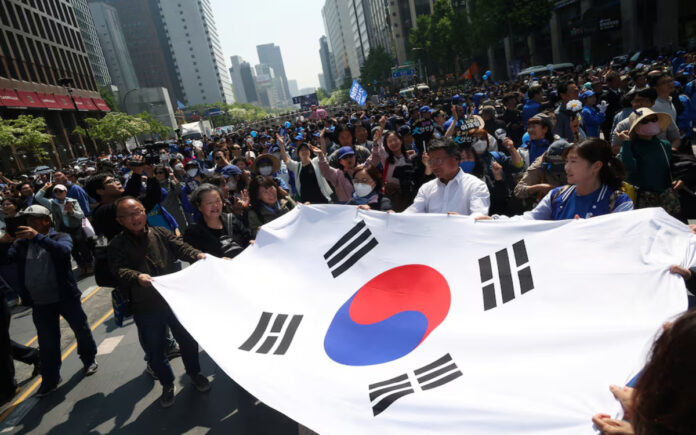Seoul: South Korea’s presidential candidates officially launched their campaigns on Monday, pledging to heal a politically fractured nation and revitalize its struggling economy, while managing strained trade relations with the United States.
The snap election, scheduled for June 3, comes after the abrupt removal of conservative President Yoon Suk Yeol, who was ousted following a controversial martial law order that threw the country into political disarray. The vote will determine who will take over leadership in Asia’s fourth-largest economy during a period of domestic and international uncertainty.
Liberal frontrunner Lee Jae-myung of the Democratic Party launched his campaign in central Seoul, where he was greeted by thousands of supporters clad in blue. The rally turned festive, with campaign songs filling the air and chants of “Lee Jae-myung, President!” echoing through the crowd.
“Will you join the journey to a new start, a new path to hope?” Lee asked the cheering supporters, donning a pair of sneakers onstage as a symbolic gesture of his readiness to work tirelessly for the nation.
Lee, who narrowly lost to Yoon in the last election, has made a dramatic political comeback. Surviving a knife attack, resisting the imposition of martial law, and enduring a series of legal challenges—including allegations tied to a $1 billion real estate development scandal—have all contributed to his growing public support. His court hearings, which include charges of bribery and corruption, have been postponed until after the election.
Due to ongoing security threats, Lee now wears a bulletproof vest at public events. On the campaign trail, he has positioned himself as a unifying figure capable of guiding the country through a turbulent economic and diplomatic era. His platform includes proposals to mitigate the impact of U.S.-imposed tariffs—a holdover from policies initiated under former President Donald Trump—and to stimulate economic growth through investments in artificial intelligence and South Korea’s booming K-pop industry.
Lee also aims to rebuild diplomatic ties with North Korea and expand South Korea’s global engagement, particularly with European partners, according to his party’s policy agenda.
Meanwhile, conservative challenger Kim Moon-soo, representing the right-wing People Power Party (PPP), began his campaign at a bustling public wholesale market in Seoul. Over a meal of Korean sausage soup shared with local vendors, Kim emphasized his commitment to reviving small businesses and addressing the country’s sluggish economy.
Also Read | Labour Government Moves to Cut Immigration with Tough New Rules, Says Starmer
Kim emerged as the party’s official nominee after merging his campaign with that of a former Prime Minister, consolidating conservative support. His candidacy has received a public endorsement from ousted President Yoon, who urged voters to support Kim in the battle against what he called “the giant opposition party.” However, this backing has caused internal tensions within the PPP, with some members advocating for Yoon’s permanent removal from party ranks.
Kim’s economic strategy centers on job creation and cultivating a business-friendly environment. He has proposed holding an immediate summit with Donald Trump to renegotiate tariff terms and improve trade conditions.
Also Read | Israel Agrees to Safe Corridor for U.S. Hostage Release, But Rejects Ceasefire with Hamas
On national security, Kim has voiced strong support for reinforcing the alliance with the United States. He also raised the controversial possibility of South Korea acquiring the right to reprocess nuclear fuel—an essential step toward potential nuclear armament—arguing it would enhance the nation’s strategic autonomy.
As the campaigns unfold, South Korea faces a pivotal choice: a return to progressive leadership focused on cultural and diplomatic outreach, or a conservative course prioritizing economic liberalism and national security.



